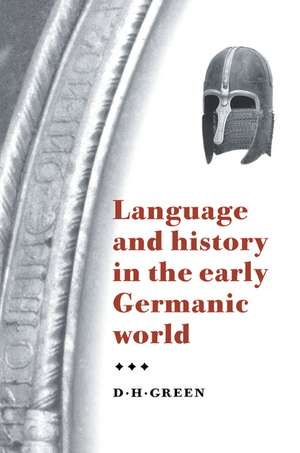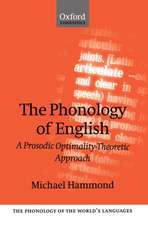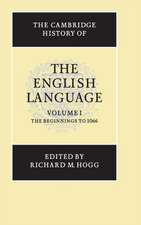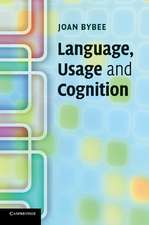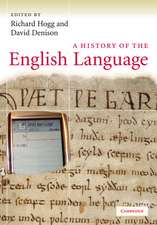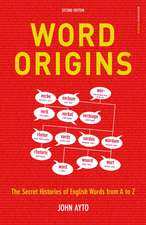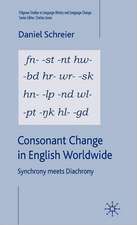Language and History in the Early Germanic World
Autor D. H. Greenen Limba Engleză Paperback – 27 aug 2000
| Toate formatele și edițiile | Preț | Express |
|---|---|---|
| Paperback (1) | 432.73 lei 6-8 săpt. | |
| Cambridge University Press – 27 aug 2000 | 432.73 lei 6-8 săpt. | |
| Hardback (1) | 606.07 lei 6-8 săpt. | |
| Cambridge University Press – 5 aug 1998 | 606.07 lei 6-8 săpt. |
Preț: 432.73 lei
Preț vechi: 486.21 lei
-11% Nou
Puncte Express: 649
Preț estimativ în valută:
82.80€ • 86.67$ • 68.92£
82.80€ • 86.67$ • 68.92£
Carte tipărită la comandă
Livrare economică 31 martie-14 aprilie
Preluare comenzi: 021 569.72.76
Specificații
ISBN-13: 9780521794237
ISBN-10: 0521794234
Pagini: 464
Ilustrații: 1 b/w illus. 1 map
Dimensiuni: 152 x 228 x 26 mm
Greutate: 0.69 kg
Ediția:Revised
Editura: Cambridge University Press
Colecția Cambridge University Press
Locul publicării:Cambridge, United Kingdom
ISBN-10: 0521794234
Pagini: 464
Ilustrații: 1 b/w illus. 1 map
Dimensiuni: 152 x 228 x 26 mm
Greutate: 0.69 kg
Ediția:Revised
Editura: Cambridge University Press
Colecția Cambridge University Press
Locul publicării:Cambridge, United Kingdom
Cuprins
Introduction; Part I. The Germanic World: 1. Religion; 2. Law; 3. Kinship; 4. Warfare; 5. People and army; 6. Lordship; 7. Kingship; Part II. Contact with the Non-Germanic World: 8. Contact with the Celts; 9. The migration of the Goths; 10. Germanic loanwords in Latin; 11. Latin loanwords in Germanic; 12. Trade and warfare with the Romans; 13. Names of the days of the week; 14. The vocabulary of writing; Part III. Contact with Christianity: 15. Problems of Christianisation; 16. The influence of provincial Roman Christianity; 17. The influence of Gothic; 18. The influence of the Merovingian Franks; 19. The influence of the Anglo-Saxons; 20. Contrasts in Christian vocabulary; 21. The vocabulary of ethics and fate; Bibliography; Index of words.
Recenzii
'This is a book like no other. The author of that classic work, The Carolingian Lord, who demonstrated the wealth of new historical evidence and insights which semantic study of the Germanic lexicon can deliver, has struck again! He now offers a general but well referenced introduction to this field for those students of late Antiquity and the earlier Middle Ages who are interested in the interface of a Roman and Christian Europe with the civilisation of its Germanic neighbours. For the cultural historian, Language and History in the Early Germanic World will be an essential companion and guide for many years to come.' David N. Dumville, University of Cambridge
Green … provide[s] a dynamic, three-dimensional picture of history, language and culture from Proto-Germanic to early medieval times. Those interested in the intersection of linguistic/philological work with (pre-) history and archeology should certainly read this book. [It] can be recommended to graduate students in Germanic historical linguistics and anyone interested in Germanic etymology. The book should also prove useful to historians and archaeologists. Joseph Salmons, Diachronica
'At last, we have an accessible and up-to-date book showing what can be done with language history. The material within Dennis Green's book is authoritative and comprehensive, its style probing and stimulating. The book encompasses a body of information essential to anyone wishing to learn about the character of the period in which the foundations of modern Europe were laid out over and around the ruins of the Roman Empire. For students of any field, it is a fine example of how and why one should make use of a cross-disciplinary approach. There could not be a better basis for understanding how we try to organize and describe our view of this crucial historical period than contemplating how the people of that era grappled with the same challenges.' John Hines, Cardiff University
Green … provide[s] a dynamic, three-dimensional picture of history, language and culture from Proto-Germanic to early medieval times. Those interested in the intersection of linguistic/philological work with (pre-) history and archeology should certainly read this book. [It] can be recommended to graduate students in Germanic historical linguistics and anyone interested in Germanic etymology. The book should also prove useful to historians and archaeologists. Joseph Salmons, Diachronica
'At last, we have an accessible and up-to-date book showing what can be done with language history. The material within Dennis Green's book is authoritative and comprehensive, its style probing and stimulating. The book encompasses a body of information essential to anyone wishing to learn about the character of the period in which the foundations of modern Europe were laid out over and around the ruins of the Roman Empire. For students of any field, it is a fine example of how and why one should make use of a cross-disciplinary approach. There could not be a better basis for understanding how we try to organize and describe our view of this crucial historical period than contemplating how the people of that era grappled with the same challenges.' John Hines, Cardiff University
Descriere
This book presents linguistic evidence for many aspects of pre-Christian and early medieval European culture.
